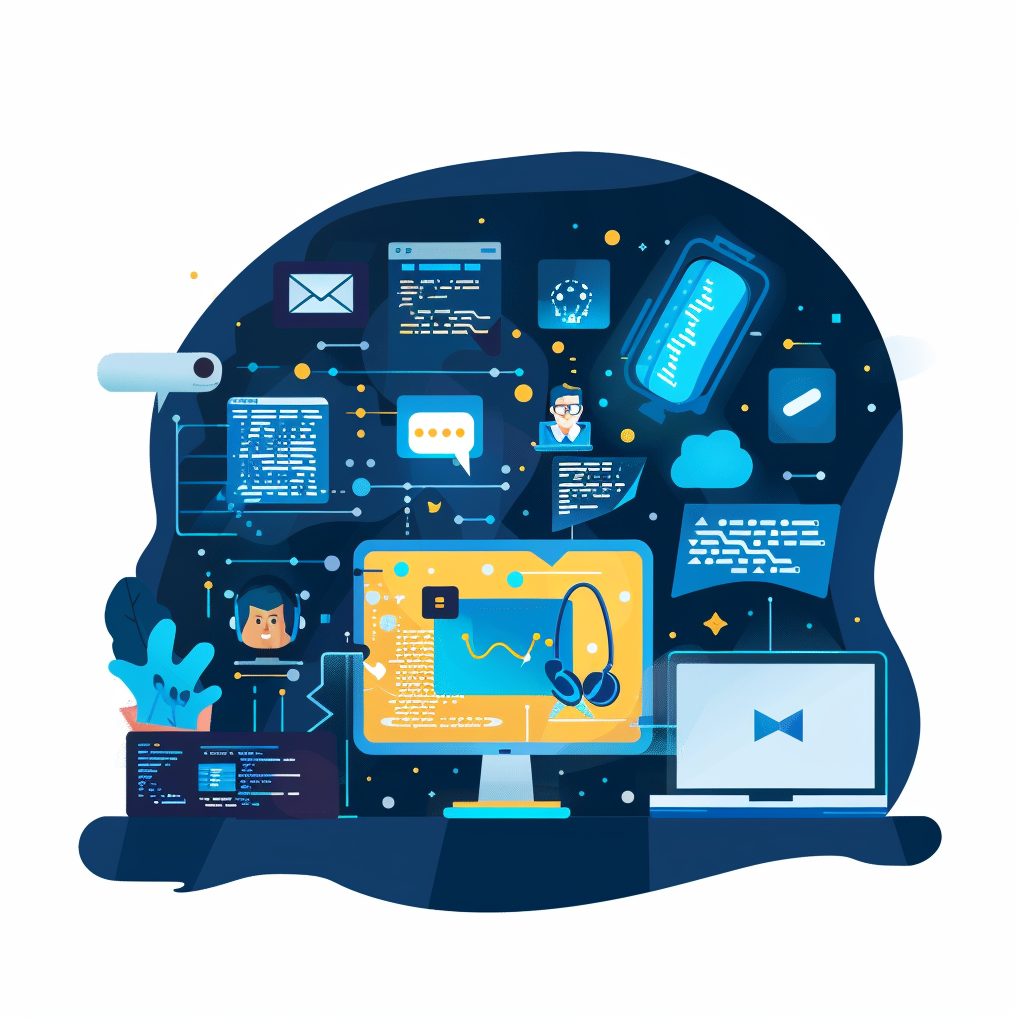People use human languages to exchange information, and servers and mobile applications use API, which stands for Application Programming Interface. The name might sound intimidating, and you might even want to close this article, but give it a chance; it is easy to understand.
API is the crux of modern software development, and the most classic example of it in action is your weather forecast app. Let’s say you want to find out the temperature for tomorrow in your town. You send the request to the app, which retrieves this information from the data server at your local meteorological center. This data exchange is possible due to the API.
Another representative example is when you have to create an account on a website, and it allows you to log in via your social media credentials. Again, API is retrieving this information from other services.
In recent years, artificial intelligence has taken API to another level by leveraging natural language processing (NLP) and machine learning (ML). Not only that, but some other AI functionalities can also be incorporated, such as sentiment analysis, predictions, content generation, personalized recommendations, and image recognition.
In this article, we’ll share reviews on the best language and speech AI APIs you can use in your business, so dive right in!

What is Text-to-Speech?
One of the most beneficial combinations of artificial intelligence and API comes in the form of text-to-speech applications, or TTS. As the name suggests, these models convert text to audio.
The essential features of TTS API are:
- Multiple language and dialect support — By using TTS, companies can ensure that their applications are accessible and user-friendly for people worldwide, regardless of their language or dialect. It is essential in today’s interconnected world.
- Voice customization — TTS platforms provide a wide array of voices that can vary in gender, age, and accent. It allows users to choose the voice that aligns best with their tastes and preferences.
- Emotionality — Some text-to-speech AI APIs can express emotions in speech by altering the intonation, emphasis, and pace. This feature particularly benefits entertainment, video gaming, and interactive storytelling.
- Text Preprocessing — Text-to-speech interfaces can manage a range of textual inputs, such as abbreviations and unconventional words, and enhance the output quality through text preprocessing.
- Scalability — TTS APIs are designed to be scalable, allowing them to easily handle large volumes of text. This feature makes them ideal for use in various applications, ranging from mobile to enterprise-level solutions.
Text-to-Speech APIs Use Cases
In today’s fast-paced world, audio content often holds more appeal for people than text, particularly when engaging with text is not possible or convenient. For this reason, businesses are looking for new ways and sectors to implement text-to-speech AI APIs.
Here are the most critical use cases of text-to-speech AI APIs:
- Education tools — Text-to-speech AI API can provide students with audio-based learning materials, which can be helpful for those who mostly learn through listening or have difficulties reading. Moreover, TTS benefits language learning applications where proper pronunciation is essential. By utilizing TTS, students can improve their listening and speaking skills by hearing words and phrases pronounced correctly.
- Customer support — TTS technologies enable businesses to automate their customer support systems. With voice response systems, customers can quickly get information such as account balances, delivery status, and order status, among others, without waiting on hold for a human representative. With the implementation of artificial intelligence properties, like NLP and machine learning algorithms, the responses to customer queries can become quicker and more accurate.
- Entertainment — Implementing TTS technologies into games can be a real game-changer (pun intended). They can provide dialogues and instructions to the gamers so that they can understand the storyline better. With text-to-speech AI APIs, people with reading and visual impairments can finally fully immerse themselves in the game, making it more enjoyable. Furthermore, TTS can be customized to match the tone and voice of specific characters, adding an extra layer of realism to the gameplay.
- Healthcare — Text-to-speech AI APIs can notify people about medication schedules, critical warnings or alerts about their health conditions, or instructions on how to use medical devices. Voice response systems are crucial for people with visual impairments or chronic diseases who may need multiple medications at different times of the day.
- Virtual assistants — Text-to-speech AI APIs power virtual assistants like Alexa and Siri, allowing them to speak to users in a human-like voice, making the interaction more engaging and intuitive. Virtual assistants can understand user requests and provide appropriate responses. They can offer a wide range of services, such as answering questions, setting reminders, managing schedules, controlling smart home devices, and providing personalized recommendations.
- Navigation — GPS systems convert written text into audio and provide drivers with turn-by-turn directions. Hence, drivers are more focused on the road; they do not have to take their eyes off it to see a screen. Traveling by car has become safer and more efficient than ever.

Best AI APIs in 2024
AWS Amazon Polly is a platform that helps to convert text into audio.
Key features:
- It provides a wide range of languages and dialects.
- It has diverse voice options.
- It leverages neural text-to-speech technology (NTTS) that improves audio quality.
Use cases of AWS Amazon Polly:
- eLearning platforms
- Games
- Internet of Things (IoT)
Limitations: The input text can have up to 3000 billed characters (6000 total). The audio stream output (synthesis) is limited to 10 minutes.
Pricing:
The free trial includes 5 million characters per month for speech or Speech Marks requests for the first 12 months after your first speech request. The cost for standard voices is $4.00 for every 1 million characters for speech or Speech Marks requests.
AssemblyAI is a Speech AI company designed to understand and transcribe human speech.
Key features:
- It has various audio formats (MP3, WAV, and others).
- It has high-quality real-time transcription.
- It provides the opportunity to create customized vocabularies.
Use cases of Assembly AI:
- Podcasts and webinars
- Business meetings
Limitations: the accuracy can be impacted by low-quality audio or significant background noise.
Pricing: The free version allows transcribing up to 100 hours of speech. Unlimited access starts at $0.12 per hour.
Speechmatics is an AI-powered platform that leverages machine learning for speech-to-text recognition.
Key features:
- It supports 48 languages with various accents and dialects.
- It has options for deploying data security through cloud-based services or on-premises installations.
- It has real-time transcription with high accuracy.
Use cases of Speechmatics:
- Content creation
- Call center solutions
- Educational products
Limitations: Speechmatichs advocate for fair queuing to provide a high-quality product for everyone. Hence, the limits are ten new jobs per second and 50 job status requests per second.
Pricing: There is a free trial; the paid version starts at $0.30 per hour.
Colossyan is an AI-powered platform that can create video from text.
Key features:
- It supports 50 avatars, which can be customized based on one’s preferences.
- It supports around 70 languages.
- It has an AI Script Assistant powered by ChatGPT-3, which can help generate ideas for the videos.
Use cases of Colossyan:
- Employee onboarding
- Customer education
- Marketing videos for their products or services
Limitations: Avatars might not seem as authentic as the human actors.
Pricing: starts at $19 per month.
OpenAI Whisper API is a project created by OpenAI, the company that produced ChatGPT. It is a speech recognition technology that converts spoken text into written.
Key features:
- It supports 60 languages.
- The accuracy of WhisperAI is approximately 92%, with an average word error rate of 8.06%, according to statistics.
- Real-time transcription is suitable for live events and streaming.
Use cases of Whisper AI:
- It can generate podcast transcripts and video captions.
- It can create automated transcription and note-taking platforms for different business sectors, like education and healthcare.
- It can build a call center assistant to communicate with the customers freely.
Limitations: it only supports video files up to 30 seconds long and audio files up to 25 MB.
Pricing: $0.006 per minute.
Google Cloud Speech API is a tool created by Google Cloud that leverages machine learning to transcribe spoken words into written text.
Key features:
- It supports 125 languages.
- It employs noise cancellation that significantly improves the quality of the audio.
- It can easily differentiate between speakers in the audio.
Use cases of Google Could Speech API:
- Media creation
- Healthcare documentation
- Educational content
Limitation: There is a limit of 10 MB on all single requests sent to the API using local files.
Pricing: There is a free version with 60 minutes of transcribing. Premium voices can be purchased for $16 per 1 million bytes.

What to consider when choosing a speech-to-text API
Selecting the right AI API can be challenging, particularly when you aim to provide top-notch products or services. There are several factors that you need to consider:
- Accuracy — The main focus should be on the transcription’s precision. Selecting an API that excels in different accents, dialects, or amidst background noise is crucial. To pick an AI API that will meet your needs, you should test it with your audio samples. This will give you a better idea of how well the API can handle the unique characteristics of your audio recordings.
- Integration — The AI API should seamlessly blend with your existing technical environment without causing any disruptions. Additionally, ensure the API’s documentation is comprehensive and straightforward, enabling developers to understand and utilize it quickly.
- Real-time or batch processing — For audio transcription, it’s essential to determine whether you require real-time or batch processing. The former is helpful for applications needing immediate transcription, such as live captioning. The latter can come in handy for processing large volumes of recorded audio files. This choice depends on the specific needs of your project and the time constraints you’re working within.
- Cost — Choose an AI API that aligns with your budget and anticipated usage volume. Prices can differ significantly depending on the requested amount, the length of audio being processed, or the desired accuracy level.
- Language and dialect support — You may need to support multiple languages and dialects depending on the location of your users and their primary languages. Different languages can present challenges, such as grammar, syntax, and vocabulary variations. Therefore, it’s essential to test how well the AI API can handle the nuances of each language, especially if you are working with languages with complex structures.
- Customization — Some AI APIs enable the customization of vocabularies or the development of language models specific to your field (for example, in the medical, legal, or technical sectors). By incorporating domain-specific language models, APIs can enhance the accuracy of natural language processing applications, making them more effective in specialized areas where accuracy is crucial.
Wrapping up
Speech AI APIs are bound to transform the world and how we interact with technologies. They will make life much more accessible and comfortable for visually impaired people or anybody with reading difficulties. In other spheres of life and business, the API assistants, such as speech AI APIs, will make all processes run smoother, faster, and with fewer hiccups. Companies can automate routine tasks, reduce errors, and improve productivity by leveraging speech AI APIs, allowing them to focus more on their core competencies, innovate, and stay ahead of the competition. So, if you are still hesitant about this technology, this is your sign for action. Integrate AI APIs into your operations and create an innovative tomorrow for everybody!
If you see the future with artificial intelligence, check out our expertise at LITSLINK. If you want the best AI solutions, send us a message.





